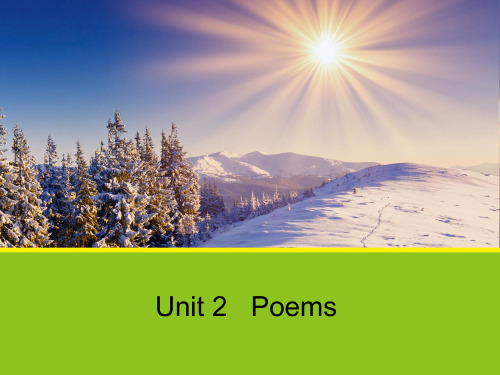人教版高中英语选修6:Poems
- 格式:pptx
- 大小:2.84 MB
- 文档页数:31


人教版高中英语选修六Unit2 Poems知识点归纳汇总1.why 引导定语从句先行词reason在定语从句中作状语用why引导定语从句;如果在定语从句中作主语或宾语时,用which或that引导定语从句。
That’s why…; 那就是……的原因That’s because…那是因为……(1)There are various reasons why people write poetry.(2)We couldn’t accept the reason he explained,for which he was late.(3)The reason why he was late is that he stayed up late last night.(4)Part of the reason why we delay is that we find the work too difficult for us.(5)That’s because the motherboard(母版) is from an older model.(6)That was why he had bought the papers with all his money.(7)That was because he was ill.(8)The reason why they changed the plan is unknown.(9)The reason why we think life is so ugly is that we imagine it being too beautiful in the past.2.convey vt.传达;运送辨析:convey 表示“传达;传送”常指通过媒介传递、输送、也常用来表示“交流、使知道、传达(信息、情感等)”transport 主要限于人或有形物体,往往是长距离的运输,常指交通运输。




Unite 2 PoemsPeriod 1 Warming up, Pre-reading, Reading (1)Teaching Goals:1. To arouse Ss’ interest in learning about English poems.2. To develop Ss’ ability of comparison.3. To arouse Ss’ interest in learning about different types of poems in the wo rld.4. To develop some basic reading skills.Teaching Procedures:Step 1 Leading-inPurpose: To activate Ss and arouse them to talk about their own little poems.The white sun sets behindmountains,The Yellow River flows into thesea.Go further up one flight of stairs,And you'll widen your view athousandli.——Wang ZhihuanShow the poem written by Wang Zhihuan and a photograph of the writer. Ask Ss to read the poem and. And see if they can remember any poems that they have learnt, either in Chinese or in English, and then ask them to recite one of them.Step 2: Warming UpPurpose: To lead Ss to the topic of this unit through a discussion.1. Pair workGet Ss to ask their partners the questions, and then ask them to present it before the class.(1) Which poem is written to tell a story?(2) Which poem is written to express feelings?(3) Which poem is written to make other laugh?…2. Group workGet Ss to talk about the world famous poets. The pictures below can be used for Ss to talk about, and Ss can also talk as much as they can.William Shakespeare George Gordon Byron Li Bai威廉·莎士比亚乔治·戈登·拜伦李白(1) William Shakespeare: English playwright and poet whose body of works is consideredthe greatest in English literature. His plays, many of which wereperformed at the Globe Theatre in London, include historical works,such as Richard II, comedies, including Much Ado about Nothing andAs You Like It, and tragedies, such as Hamlet, Othello, and KingLear. He also composed 154 sonnets. The earliest collected edition ofhis plays, the First Folio, contained 36 plays and was publishedposthumously (1623).(2) George Gordon Byron: British poet acclaimed as one of the leading figures of theRomantic Movement. The Byronic hero lonely, rebellious, andbrooding first appeared in Manfred (1817). Among his other works areChilde Harold (1812-1818), The Prisoner of Chilton (1816), and theepic satire Don Juan (1819-1824). Byron was notorious for his loveaffairs and unconventional lifestyle. He died while working to secureGreek independence from the Turks.(3) Li Bai: Chinese poet who spent much of his time wandering and composingromantic, wine-inspired verse.Conclusion: All these poets are well known to the whole world and do you know any poems written by them? Can you recite to all the class?Step 3. Pre-readingPurpose: To help Ss learn about the context of the Reading part.1. Group workAsk Ss to discuss the questions with their partners in groups of four.(1) Do you have a favorite poem in Chinese?(2) Why is it your favorite poem?(3) Do you have a favorite poem in English?(4) Why is it your favorite poem?For example:(1) My favorite poem in Chinese is: 去年今日此门中,人面桃花相映红。